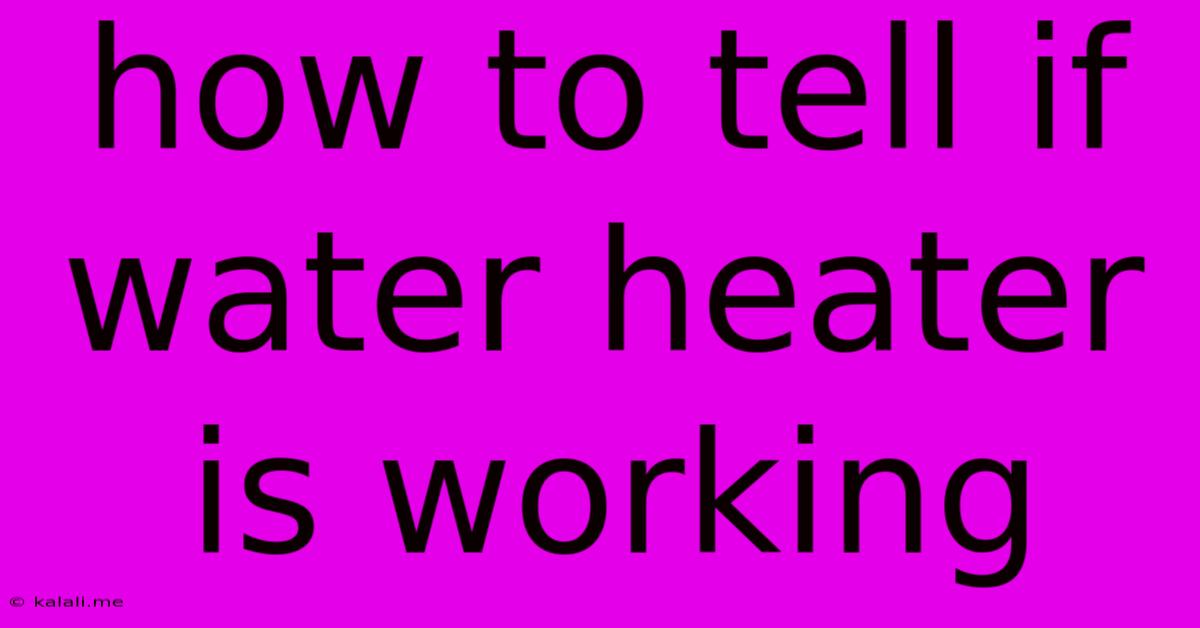How To Tell If Water Heater Is Working
Kalali
Jun 04, 2025 · 3 min read

Table of Contents
How to Tell if Your Water Heater is Working (and Troubleshooting Common Issues)
Is your shower suddenly icy cold? Are your dishes refusing to get properly clean? These are telltale signs that your water heater might be malfunctioning. Knowing how to quickly assess your water heater's status can save you time, money, and a whole lot of frustration. This guide will walk you through how to tell if your water heater is working correctly and troubleshoot common problems.
Understanding Your Water Heater's Basics: Before diving into troubleshooting, it's helpful to understand the basics. Most homes have either a gas or electric water heater. Both work by heating water stored in a tank, but their ignition sources differ significantly. Familiarize yourself with your water heater's type to better understand the potential problems you might encounter.
Signs Your Water Heater is Working Properly:
- Hot Water: The most obvious sign! Turn on a hot water tap. If you get consistently hot water at the expected temperature, your water heater is likely working fine. If the water is lukewarm or only slightly warm, there might be a problem.
- Consistent Temperature: The temperature should remain relatively consistent throughout your hot water usage. Fluctuations could indicate issues with the heating element (electric) or gas burner (gas).
- No Unusual Noises: Listen closely to your water heater. Unusual noises like rumbling, banging, or popping could indicate sediment buildup, a failing heating element, or other problems. A quiet hum (for electric heaters) or a gentle whoosh (for gas heaters) is usually normal.
- Proper Pressure Relief Valve: Your water heater should have a pressure relief valve, usually located near the top. This valve should be checked periodically to ensure it's not leaking. A small drip occasionally is normal, but excessive leaking warrants immediate attention.
- Visible Pilot Light (Gas Water Heaters): If you have a gas water heater, check for a consistently lit pilot light. If the pilot light is out, the heater won't be able to ignite and heat the water.
Troubleshooting Common Water Heater Problems:
If your water heater isn't working as it should, here are some common problems and how to identify them:
1. No Hot Water:
- Check the circuit breaker (electric): Ensure the circuit breaker for your water heater hasn't tripped. Reset it if necessary.
- Inspect the gas supply (gas): Make sure the gas supply valve is turned on. If it's a pilot-less ignition, check the battery and ensure there's no error code displayed.
- Examine the pilot light (gas): For traditional gas water heaters, ensure the pilot light is lit. Relight it if necessary, following the manufacturer's instructions.
2. Lukewarm Water:
- Sediment buildup: Over time, sediment can accumulate at the bottom of the tank, reducing its efficiency. This often requires flushing the tank.
- Low water level: Check the water level in your tank. If it's low, you'll need to refill it.
- Faulty heating element (electric): A faulty heating element will not effectively heat the water. This often requires replacement.
- Faulty gas burner (gas): Similar to an electric heating element, a gas burner failure necessitates replacement.
3. Strange Noises:
- Sediment buildup: Rumbling or banging noises are often caused by sediment buildup.
- Expansion tank problems (if applicable): An expansion tank, which helps manage pressure fluctuations, might be malfunctioning.
- Thermostat issues: A faulty thermostat may cause erratic heating and unusual sounds.
4. Leaking Water Heater:
- Check the pressure relief valve: A leaking pressure relief valve needs immediate attention.
- Inspect the tank for cracks or corrosion: If you find visible damage to the tank, it'll need replacement.
When to Call a Professional:
While many minor issues can be addressed with simple troubleshooting, some problems require the expertise of a qualified plumber or HVAC technician. If you suspect a serious problem, such as a significant leak, gas leak, or if you're uncomfortable performing any repairs, it's best to contact a professional immediately.
By following these steps, you can effectively determine if your water heater is working correctly and address minor problems. Remember safety is paramount. If you are unsure about any aspect of troubleshooting, always consult a professional.
Latest Posts
Latest Posts
-
Are All Rational Numbers Are Whole Numbers
Jun 06, 2025
-
Car Overheats When Ac Is On And Idle
Jun 06, 2025
-
Send Someone Elses Code To Potential Employeer Dont Have
Jun 06, 2025
-
Big Piece In There Life Symonyms
Jun 06, 2025
-
No Country For Old Men Llewelyn Death
Jun 06, 2025
Related Post
Thank you for visiting our website which covers about How To Tell If Water Heater Is Working . We hope the information provided has been useful to you. Feel free to contact us if you have any questions or need further assistance. See you next time and don't miss to bookmark.